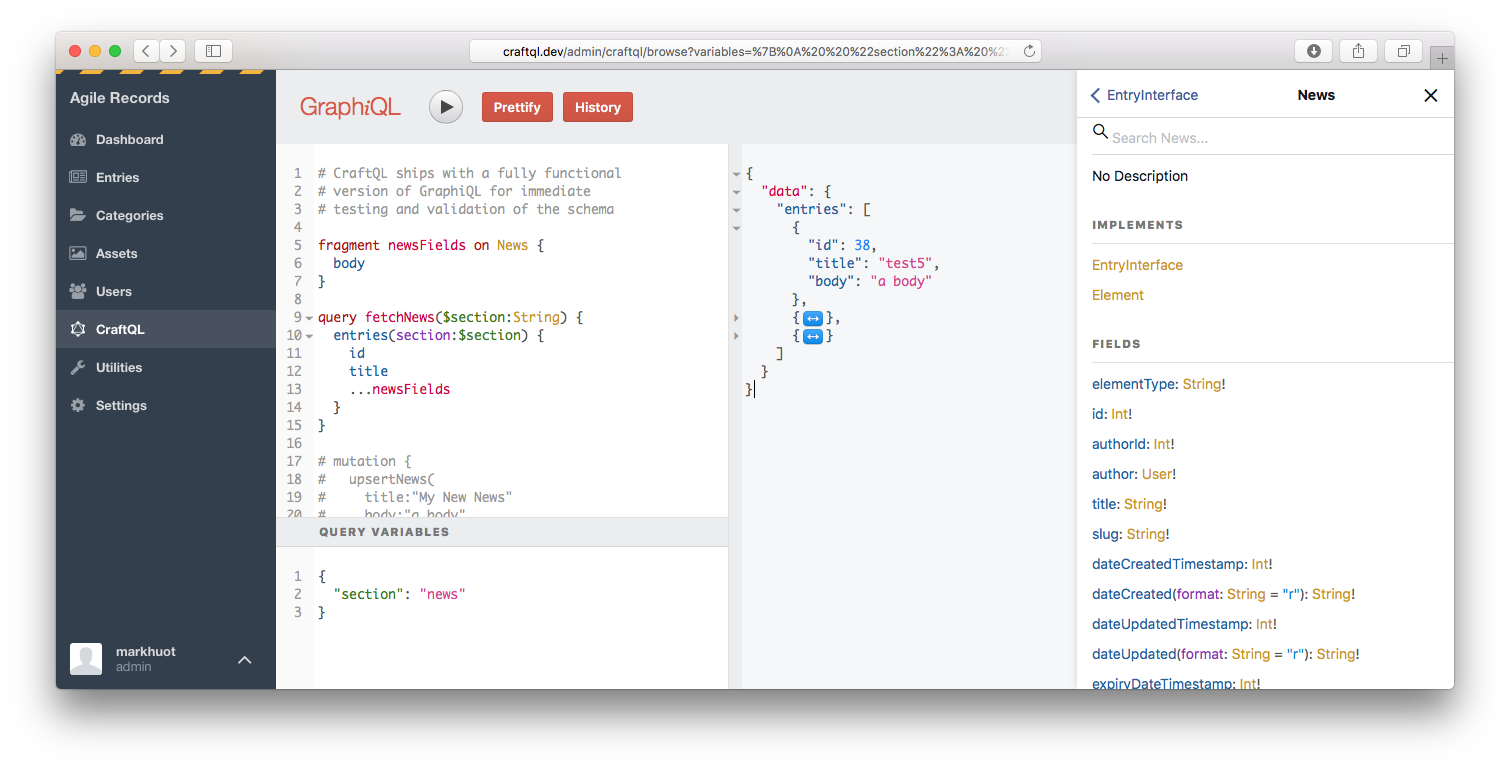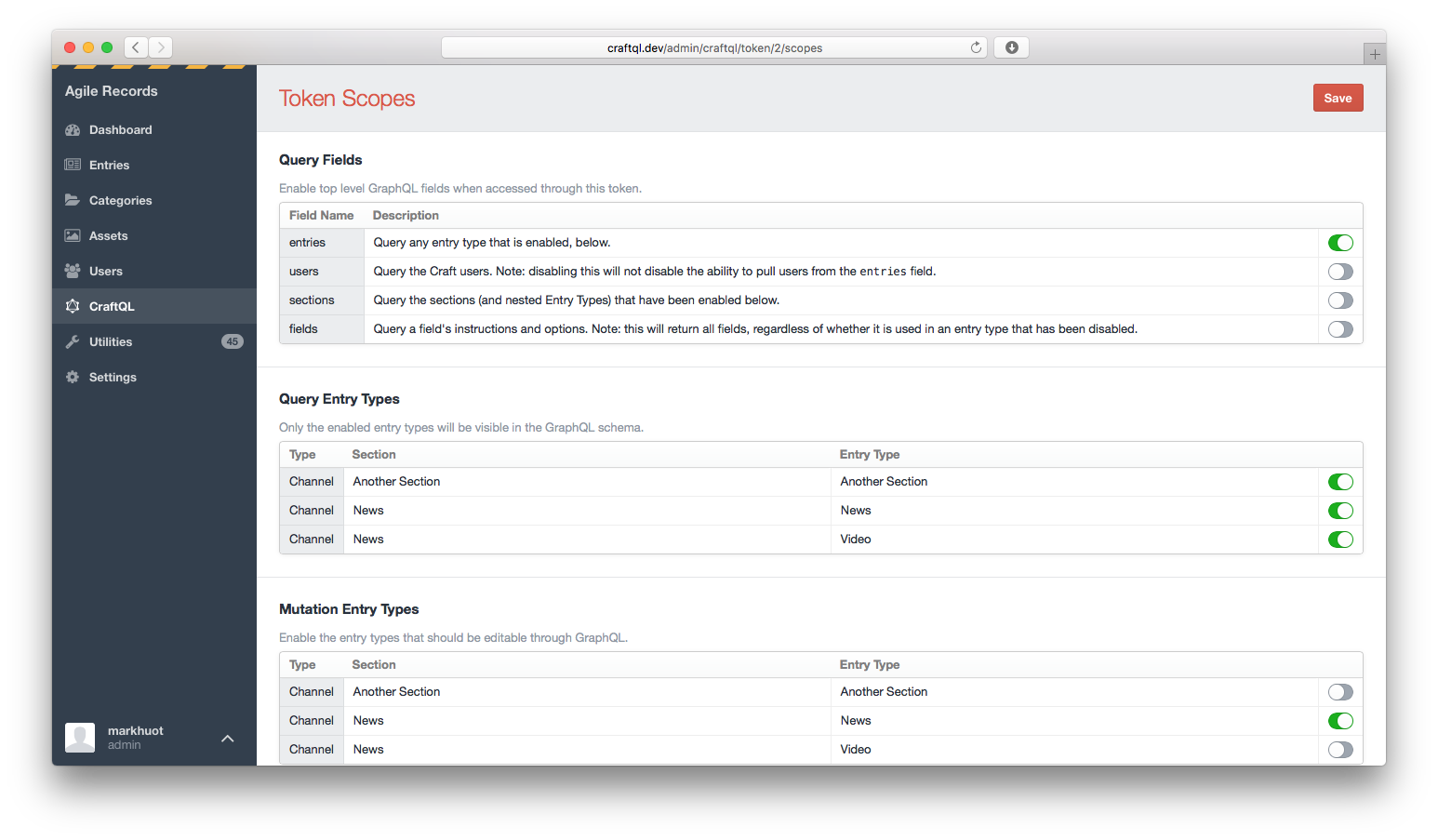Download the PHP package markhuot/craftql without Composer
On this page you can find all versions of the php package markhuot/craftql. It is possible to download/install these versions without Composer. Possible dependencies are resolved automatically.
Informations about the package craftql

A drop-in GraphQL server for your Craft CMS implementation. With zero configuration, CraftQL allows you to access all of Craft's features through a familiar GraphQL interface.
Examples
Once installed, you can test your installation with a simple Hello World,
If that worked, you can now query Craft CMS using almost the exact same syntax as your Twig templates.
CraftQL provides a top level entries field that takes the same arguments as craft.entries does in your template. This is the most commonly used field/access point. E.g.,
Types are automatically created for every Entry Type in your install. If you have a section named news and an entry type named news the GraphQL type will be named News. If you have a section named news and an entry type named pressRelease the GraphQL type will be named NewsPressRelease. The convention is to mash the section handle and the entry type handle together, unless they are the same, in which case the section handle will be used.
To modify content make sure your token has write access and then use the top level upsert{EntryType} Mutation. upsert{EntryType} takes arguments for each field defined in Craft.
The above would be passed with variables such as,
Matrix Fields
Working with Matrix Fields are similar to working with Entry Types: if you have a Matrix Field with a handle of body, the containing Block Types are named Body + the block handle. For instance BodyText or BodyImage. You can use the key __typename from the resulting response to map over the blocks and display the appropriate component.
Dates
All Dates in CraftQL are output as Timestamp scalars, which represent a unix timestamp. E.g.,
Dates can be converted to a human friendly format with the @date directive,
Relationships
Related entries can be fetched in several ways, depending on your needs.
Similar to craft.entries.relatedTo(entry) you can use the relatedTo argument on the entries top level query field. For example, if you have a Post with an ID of 63 that is related to comments you could use the following.
Note, the relatedTo: argument accepts an array of relations. By default relatedTo: looks for elements matching all relations. If you would like to switch to elements relating to any relation you can use orRelatedTo:.
The above approach, typically, requires separate requests for the source content and the related content. That equates to extra HTTP requests and added latency. If you're using the "connection" approach to CraftQL you can fetch relationships in a single request using the relatedEntries field of the EntryEdge type. The same request could be rewritten as follows to grab both the post and the comments in a single request.
Transforms
You can ask CraftQL for image transforms by specifying an argument to any asset field. Note: for this to work the volume storing the image must have "public URLs" enabled in the volume settings otherwise CraftQL will return null values.
If you have defined named transforms within the Craft UI you can reference the transform by its handle,
You can also specify the exact crop by using the crop, fit, or stretch arguments as specified in the Craft docs.
Drafts
Drafts are best fetched through an edge node on the entriesConnection query. You can get all drafts for an entry with the following query,
Categories and Tags
Taxonomy can be queried through the top level categories or tags field. Both work identically to their craft.entries and craft.tags counterparts.
For added functionality query categories and tags through their related Connection fields. This provides a spot in the return to get related entries too,
Users
Users can be queried via a top-level users field,
You can also mutate users via the upsertUser field. When passed an id: it will update the user. If the id: attribute is missing it will create a new user,
Permissions can be set as well, but you must always pass the full list of permissions for the user. E.g.,
Security
CraftQL supports GraphQl field level permissions. By default a token will have no rights. You must click into the "Scopes" section to adjust what each token can do.

Scopes allow you to configure which GraphQL fields and entry types are included in the schema.
Third-party Field Support
To add CraftQL support to your third-party field plugin you will need to listen to the craftQlGetFieldSchema event. This event, triggered on your custom field, will pass a "schema builder" into the event handler, allowing you to specify the field schema your custom field provides. For example, in your plugin's ::init method you could specify,
The above, when called for a Post entry type on the excerpt field would generate a schema approximately equlilivant to,
If your custom field resolves an object you can expose that to CraftQL as well. For example, if you are implementing a custom field that exposes a map, with a latitude, longitute, and a zoom level, it may look like,
Roadmap
No software is ever done. There's a lot still to do in order to make CraftQL feature complete. Some of the outstanding items include,
- [x] Matrix fields are not included in the schema yet
- [x] Table fields are not included in the schema yet
- [x] Asset mutations (implemented by passing a URL or asset id)
- [ ] File uploads to assets via POST $_FILES during a mutation
- [x] Automated testing is not functional yet
- [x] Automated testing doesn't actually test anything yet
- [x] Mutations need a lot more testing
- [x]
relatedEntries:improvements to take source/target - [ ] Persisted queries
- [ ] Subclassed enum fields that are able to return the raw field value
Requirements
- Craft 3.6.0+
- PHP 7.0+
Installation
If you don't have Craft 3 installed yet, do that first:
Once you have a running version of Craft 3 you can install CraftQL with Composer:
Running the CLI server
CraftQL ships with a PHP-native web server. When running CraftQL through the provided web server the bootstrapping process will only happen during the initial start up. This has the potential to greatly speed up responses times since PHP will persist state between requests. In general, I have seen performance improvements of 5x (500ms to <100ms).
Caution: this can also create unintended side effects since Craft is not natively built to run this way. Do not use this in production it could lead to memory leaks, server fires, and IT pager notifications :).


